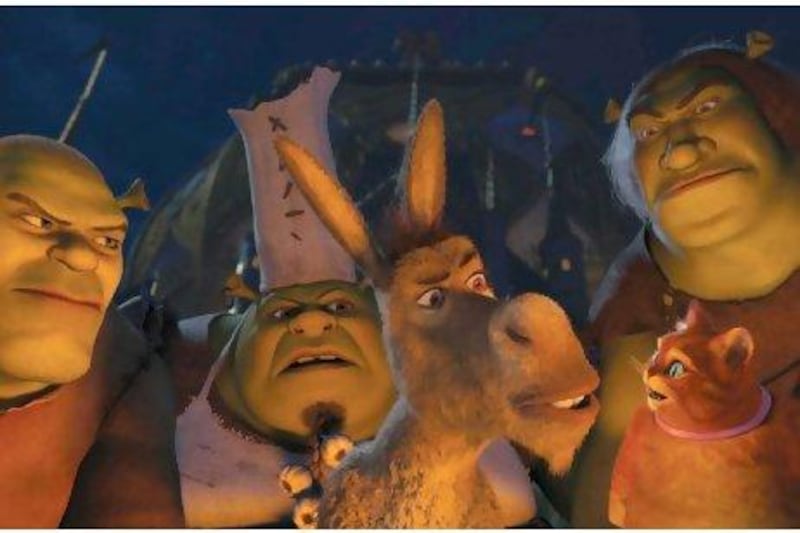Shrek Forever After Director: Mike Mitchell Starring: Mike Myers, Cameron Diaz, Eddie Murphy
Created by DreamWorks - the studio started up by the disgruntled ex-Disney employee, Jeffrey Kratzenberg, the director with the Midas touch, Steven Spielberg, and the veteran producer, David Geffen, in 2001 - the first Shrek film was the recipient of the inaugural Academy Award for Best Animated Feature in 2001. Featuring the vocal talents of Mike Myers as the title character, an ogre with a heart of gold, and funnyman Eddie Murphy as a wise-cracking talking donkey, the film cleared up at the international box office.
The Shrek machine spawned two sequels over the following six years; both commercial (if not entirely critical, in the case of Shrek the Third) successes.
Three years later and we return to a very different Shrek from the first movie. Gone are the days when our lurid green friend could wallow freely in his own filth; he now has three snotty children to take care of. Gone, too, are the days when a mere glimpse of his hulking form would send villagers into a blind panic, his past adventures having by now turned him into an A-list celebrity.
But all is not well in Shrek's new life - he's feeling the pressure of fatherhood, and feels that fame and domesticity have robbed him of his "ogreliness". At his children's first birthday party, he's visibly unhappy about being asked for his autograph, and after being harassed by a bratty child asking that he "roar" for him, Shrek loses his temper completely before the entire room of guests. Shortly after storming out of the party, he runs into the slimy Rumplestiltskin, who makes him a seemingly tempting offer; in exchange for retrospectively forfeiting one day from his childhood, he'll get to live one day as his old ogre self, pre-fame and family. But unbeknown to Shrek, who thinks his meeting with the seedy character is based on pure coincidence, Rumplestiltskin has other plans in mind, namely revenge. And so the day he chooses to wipe from Shrek's past is a rather crucial one - the day he was born. Waking up in the kingdom of Far Far Away, where things have changed considerably as a result, Shrek has a lot to put right and only 24 hours in which to do it.
Shrek Forever After is a good, if not strictly necessary, chapter in the popular series, and it's considerably better than the third instalment. After almost 10 years the plot has worn precariously thin, but given that the strength of the characters was always the biggest selling point of the franchise, this isn't a particularly serious problem. By far the most enjoyable scenes in what one hopes will be the final film are those involving Puss in Boots. The charming feline felon, voiced by Antonio Banderas, has not come out well in a world where Shrek does not exist. Verging on morbidly obese as a result of his new position as Princess Fiona's pet, the jokes that follow are achingly wonderful in their simplicity. Ever wondered how funny it would be to see a fat cat slide comically slowly down a wall? The answer is, of course, very. Coming in a very respectable second place is the movie's villain, Rumplestiltskin, portrayed by the relatively unknown voice actor, Walt Dohm. His Rumplestiltskin is perfect as the character people love to hate. In the parallel Far Far Away, Rumplestilskin has taken over the Kingdom, accompanied by his monstrous and sinister pet goose, his army of witches in charge of capturing stray ogres. What he lacks in height, he certainly makes up for in sliminess and smarminess, all of which produces plenty of laugh-out-loud moments. But despite the rather straightforward storyline, both Donkey and Fiona - the latter of whom is now the exalted leader of a group of rebel ogres - are only given a small amount of screen time; as if their scenes were added in as an afterthought. The soundtrack is, as always, a work of art, including One Love by the inimitable Bob Marley; Top of the World by The Carpenters; Sure Shot by The Beastie Boys and many more. The biggest commercial success to date for the director, Mike Mitchell, Shrek Forever After is a decent final chapter for the multi-million dollar franchise. We just wish there had been a bit more Donkey.





